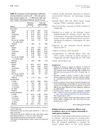 47 citations,
March 2004 in “European journal of endocrinology”
47 citations,
March 2004 in “European journal of endocrinology” Spironolactone plus finasteride reduces hirsutism more effectively.
 41 citations,
September 2018 in “Australasian journal of dermatology”
41 citations,
September 2018 in “Australasian journal of dermatology” No systemic treatment for alopecia areata has strong evidence of effectiveness.
 39 citations,
August 2004 in “International journal of gynaecology and obstetrics”
39 citations,
August 2004 in “International journal of gynaecology and obstetrics” Finasteride and CPA-EE2 equally reduce hirsutism, but affect hormone levels differently.
36 citations,
March 1989 in “British journal of dermatology/British journal of dermatology, Supplement” DPCP is more effective than tretinoin gel for treating severe alopecia.
 32 citations,
July 1999 in “Fertility and Sterility”
32 citations,
July 1999 in “Fertility and Sterility” Finasteride and flutamide both reduce hair growth, but finasteride has fewer side effects.
 29 citations,
July 2009 in “Journal of Dermatology”
29 citations,
July 2009 in “Journal of Dermatology” 5% minoxidil works better for hair growth than 1% minoxidil.
 28 citations,
December 2017 in “Lasers in Medical Science”
28 citations,
December 2017 in “Lasers in Medical Science” Monochromatic light devices, especially the 308-nm excimer laser, are promising for treating alopecia areata but more research is needed.
 27 citations,
December 2005 in “Journal of Cosmetic Dermatology”
27 citations,
December 2005 in “Journal of Cosmetic Dermatology” Niacin derivatives may increase hair fullness in women with hair loss.
21 citations,
March 1982 in “JAMA” Spironolactone is effective and safe for treating excessive facial hair in women.
16 citations,
April 2020 in “Dermatology practical & conceptual” Laser treatment can effectively reduce unwanted hair growth, particularly for people with fair skin and dark hair.
15 citations,
January 2015 in “International journal of medical research and health sciences” Platelet rich plasma is as effective as triamcinolone for treating alopecia areata.
 12 citations,
September 2020 in “Journal of cosmetic dermatology”
12 citations,
September 2020 in “Journal of cosmetic dermatology” Trichoscopy is useful for diagnosing and monitoring alopecia areata treatment.
 12 citations,
December 2002 in “Fertility and Sterility”
12 citations,
December 2002 in “Fertility and Sterility” Spironolactone plus finasteride works better for treating hirsutism.
 11 citations,
December 1987 in “Aesthetic Plastic Surgery”
11 citations,
December 1987 in “Aesthetic Plastic Surgery” The document concludes that the hCG protocol may help in obesity treatment and could be scientifically justified, but more research is needed.
 10 citations,
November 2014 in “Journal of Dermatological Treatment”
10 citations,
November 2014 in “Journal of Dermatological Treatment” Polyphenols may help treat skin conditions like warts, hair loss, acne, and dark spots, but more research is needed.
 8 citations,
June 2019 in “Journal of Cosmetic Dermatology”
8 citations,
June 2019 in “Journal of Cosmetic Dermatology” Using a nonablative fractional laser with topical minoxidil can effectively and safely promote hair regrowth in alopecia areata patients.
 7 citations,
September 2018 in “Aesthetic surgery journal”
7 citations,
September 2018 in “Aesthetic surgery journal” Deoxycholic acid effectively reduces double chin fat with temporary side effects and high patient satisfaction.
 5 citations,
April 2013 in “Nasza Dermatologia Online”
5 citations,
April 2013 in “Nasza Dermatologia Online” Oral zinc therapy is effective for treating acrodermatitis enteropathica.
 4 citations,
December 2011 in “Journal of The American Academy of Dermatology”
4 citations,
December 2011 in “Journal of The American Academy of Dermatology” Using more minoxidil solution can lead to better hair growth, but people often use only half the recommended amount. Education and motivation can improve results.
 2 citations,
July 2023 in “Obstetrics & Gynecology”
2 citations,
July 2023 in “Obstetrics & Gynecology” Imiquimod may be a better non-surgical treatment for cervical pre-cancer, but its effectiveness for vaginal pre-cancer is unclear, and it has some side effects.
 2 citations,
March 2021 in “Dermatologic Therapy”
2 citations,
March 2021 in “Dermatologic Therapy” Low-level laser therapy helps increase hair growth in female pattern hair loss but not in telogen effluvium.
 1 citations,
September 2023 in “Journal of cosmetic dermatology”
1 citations,
September 2023 in “Journal of cosmetic dermatology” Autologous FUE hair transplantation is effective and safe for treating hair loss due to scarring from infections.
 1 citations,
March 2011 in “Informa Healthcare eBooks”
1 citations,
March 2011 in “Informa Healthcare eBooks” Hormonal therapy is effective for treating acne in adult women, especially with signs of high androgen levels.

Nanoformulations improve luteolin's effectiveness as a cancer treatment.

Melatonin and photobiomodulation are effective for treating Alopecia X in German Spitz dogs.
 February 2024 in “Scientific Reports”
February 2024 in “Scientific Reports” Topical minoxidil and dietary supplements improved hair regrowth in children with hair loss from chemotherapy.
 February 2024 in “Journal of Cosmetic Dermatology”
February 2024 in “Journal of Cosmetic Dermatology” Using a laser with bimatoprost solution works better for hair regrowth in alopecia areata than bimatoprost alone.
 September 2023 in “Journal of Rawalpindi Medical College/Journal Rawalpindi Medical College”
September 2023 in “Journal of Rawalpindi Medical College/Journal Rawalpindi Medical College” Birth control pills with cyproterone acetate and drosperinone can reduce excessive hair growth in women with PCOS, but they may not be right for everyone.
 June 2023 in “International journal of pharmaceutical quality assurance”
June 2023 in “International journal of pharmaceutical quality assurance” Eclipta alba extract could be a promising natural treatment for hair loss.
 April 2023 in “Research Square (Research Square)”
April 2023 in “Research Square (Research Square)” Combining stromal vascular fraction (SVF) injections with fractional CO2 laser treatment is more effective for treating burn scars than using the laser alone.


























